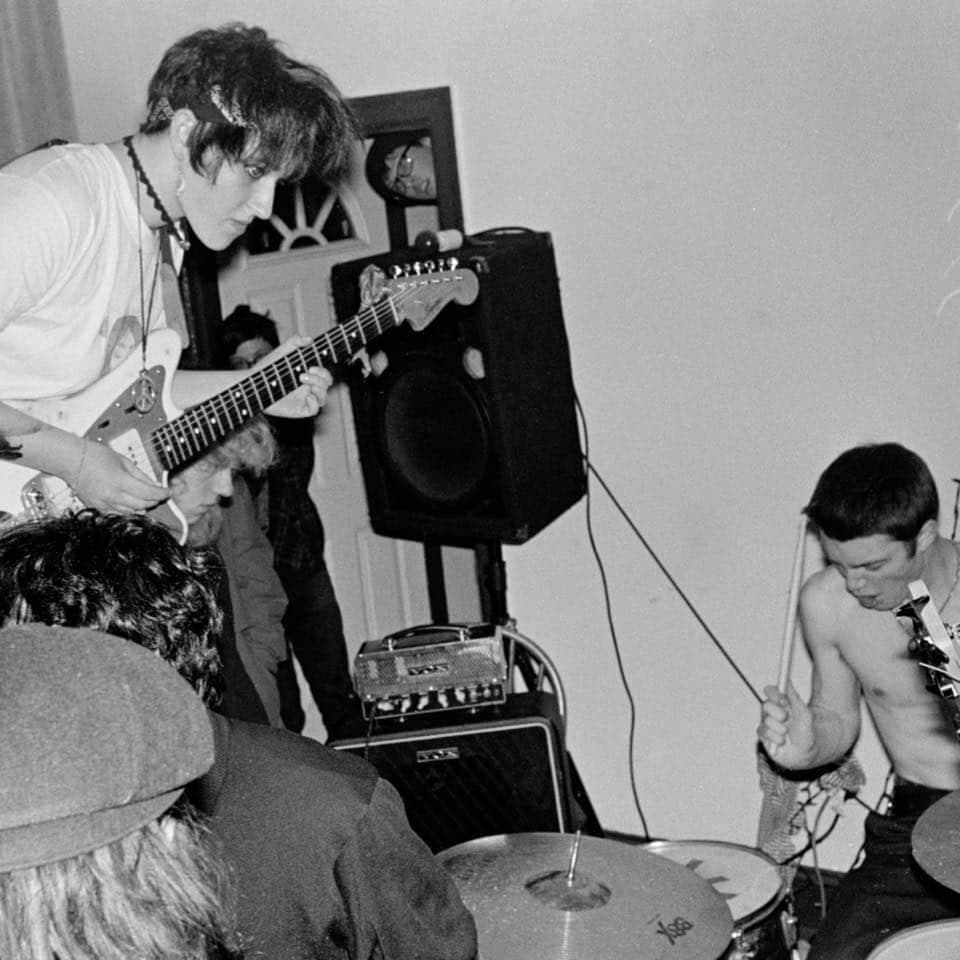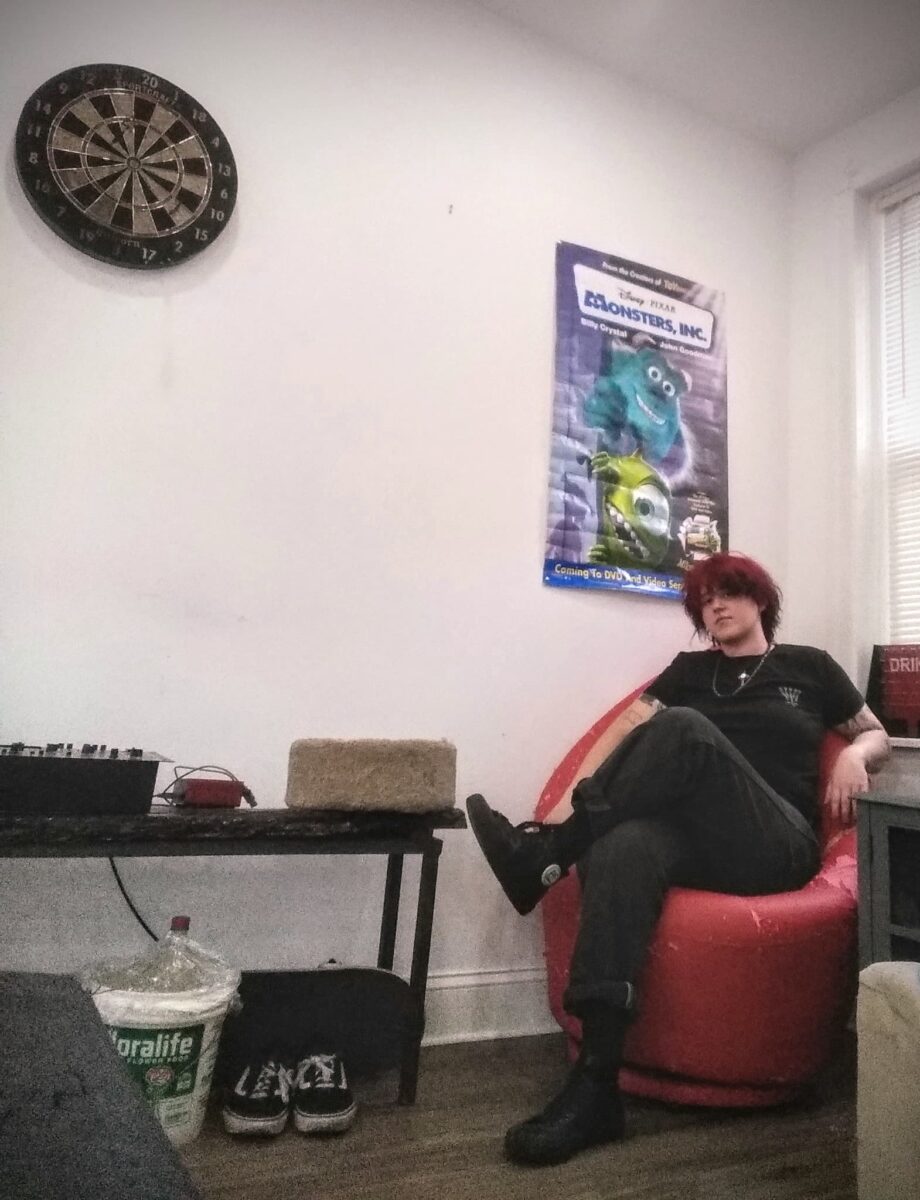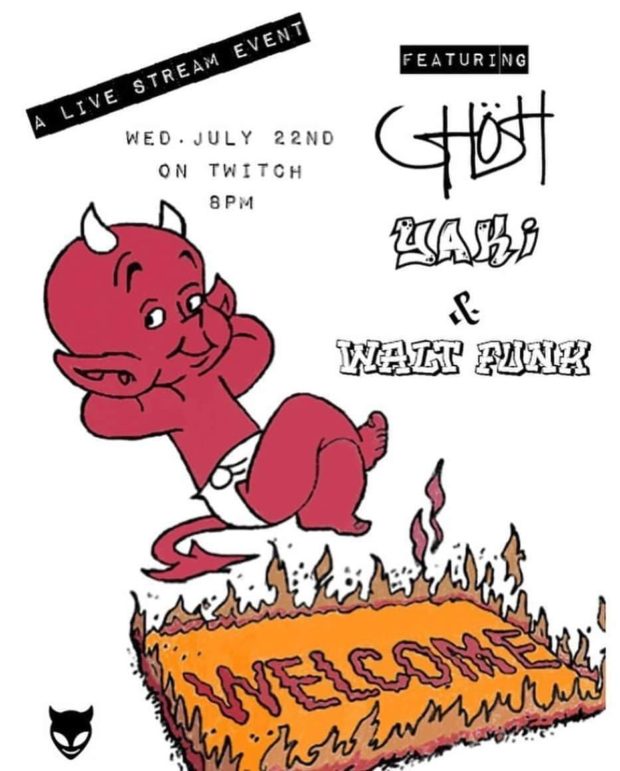
Rachel Levin of Eat | photo courtesy of the artist
This is Essential: Rachel Levin from Eat
During the coronavirus pandemic most people have been forced to work from home or, worse yet, they’ve been laid off or furloughed. But not everybody. We decided it would be interesting and important to shine a spotlight on some of the essential workers who are also members of our music community for a series we’re calling This Is Essential.
While so many aspects of our lives have changed monstrously over the past few months, one of the only things that’s remained consistent – albeit with social distancing and the almost humorous run on flour and toilet paper – has been grocery stores. The employees at those stores are not just essential workers but most of them are hourly, making not much more than minimum wage. While the rest of the country rightly shut down back in March, these people were still at work, right along with doctors, nurses, and everyone else who is totally necessary for our everyday life to continue.
Like the rest of us, they’ve had to deal with the pandemic but on top of that they’ve also had to learn on-the-fly whatever the latest safety precautions are and put up with a largely clueless public. But unlike a large chunk of that public who have been able to collect unemployment, these workers in many cases haven’t even gotten much hazard pay.
Rachel Levin is one of them. The 21 year old Philly native has been working at a supermarket for the past few years and actually switched to full time when the pandemic hit. We talked about their reasons for that, their no wave band Eat and their other projects Walt Funk and Itchy Kisses, and a lot more during a conversation on what was their first day off in almost a week.

The Key: Why did you end up working working in a grocery store?
Rachel Levin: I’ve worked at this particular grocery store because it pays more than every other grocery store and a lot of service jobs. I don’t have a college degree so it’s kind of one of the only jobs I can get. And also they’re pretty good with, like, flexibility regarding [bands]; I went on a tour earlier this year for two weeks and they didn’t say anything about it.
TK: I feel like that’s one of the main reasons people end up with jobs in food service. It’s why when quarantine first started it was such a big hit to the music communities. So many folks end up with these jobs because they allow some sort of flexibility.
RL: The flexibility was more so a huge thing for me before coronavirus because Eat had multiple tours planned for this summer, which obviously got canceled. It was really nice to have that option to just be able to take off as much time as I wanted to and then come back and just make my money. Now I’m kind of in this situation where, because the whole DIY scene or at least shows are non-existent now, I decided it would be a good idea to start working full time.
Before the whole pandemic I was working like, three, four days a week, and I was able to make my rent but now I’m working full time so that next summer I can buy a van. I never owned a car before but I think that would be a good thing [so] if shows start to become a thing again I have a tour van.
TK: What was the immediate impact of the quarantine?
RL: It was really weird. I didn’t really have an option of not going to work. [I’m] working at a grocery store as opposed to a restaurant and it’s still considered the food service industry. Everyone at restaurants got laid off and then was able to get on unemployment whereas I didn’t have that option. Will [the drummer of Eat] told me he was making twice as much as I was and just sitting in his house all day playing music while I was working over 40 hours a week.
TK: That is hot garbage. How are your stress levels?
RL: In the beginning I honestly wasn’t that concerned and was taking it kind of lightly because I didn’t realize the severity of it. Then it started getting worse and worse and cases started just like multiplying and growing in number. I haven’t seen a lot of my friends in a really long time — including everyone in Eat, we haven’t practiced since the pandemic started. But there was this one night, basically the last night I hung out with my friends, we had a kickback. It was just me and like three other people and we’re just drinking pina coladas and talking about how the world was ending. That was the last time I chilled with anyone, basically.
We were kind of brushing it off and thinking it would get better soon. Ever since that night my stress level has just gone up and up. Considering the fact I started working full time after that and haven’t been able to see my friends … I don’t know. Shit kind of like plateaued for a while regarding case numbers but it hasn’t gone down and [stores] are opening back up. Regarding that I’m fucking nervous. People are going back to work [and] people are going out to eat, which they fucking shouldn’t be. In doing all that more people are interacting, people are going to parties and shit, and there’s more of a chance people are going to contract coronavirus and bring it to me in my workplace.
Whereas before nobody was going to work, nobody was going to parties, because everything was shut down. So even with the people that came in [to my job] there was less of a chance for me to get it. The grocery store was taking precautions, like we were doing more cleaning and everyone was really on their shit about being protective, but it’s just not like that now. People seem to think it’s getting better but it’s not.
TK: I’ve been seeing that in my neighborhood a lot with people out partying all the time and just hanging out, like there isn’t a pandemic going on.
RL: Yeah, it’s really weird. One of my co-workers is from Texas and she was saying that apparently down there nobody is wearing masks, like out in public, and if you wear one they look at you like you’re crazy.
TK: I was up in Fishtown briefly last week and at Front and Girard everybody is out partying and very few of them are wearing masks and it’s so uncomfortable.
RL: Fishtown is a lot of young, careless people who are all about the bar scene. I used to live down the street from Johnny Brenda’s at Girard Hall [ed. note: an occasional venue above Everybody Hits]. I guess it’s people who don’t care because they’re young and healthy and think that, “If I contract coronovarius I’ll be fine.”
TK: Wait, what’s the difference between them and you? You’re 21!
RL: I don’t know. Most of my friends are older. It’s always been that way for some reason. People often think that I’m way older than I am. I’ve been told that I’m, like, “mature beyond my years” or whatever [laughs]. I moved out of my house when I was 16 and I’ve been living on my own [since then.]
A lot of people who like go to bars in Fishtown, they’re still at college at like Temple or, I don’t know, they live off their parents’ dime and have never known any real sort of struggle. I’ve been out here busting my ass since I was 16 to pay my rent.
TK: What have you been been doing to to maintain?
RL: Towards the beginning I kind of recognized that playing music and stuff, which was basically all I did before, was going to not really be the same for a very long time. So that’s when I decided to work full time and I set this goal to buy the van by next summer. Like I literally haven’t been doing very much but working my ass off. I did put out a music video last week for my solo project.
TK: What have you been listening to?
RL: Someone put me in this no wave group on Facebook recently and people just post random shit in all the time and I’ve kind of just been clicking on the links they’ve been posting. I’ve been listening to a lot of trap music. I bike five to ten miles every day. It’s really good for biking. It’s very energetic.

TK: How has your background in music and the time you’ve spent in the DIY community influenced your life?
RL: From the point that I first started going to house shows up until now I immediately realized that there was a lack of representation of female, people of color, and marginalized people. The first house show I went to it was literally all white dudes playing and like so on and so forth. The first year I was going to shows it was mostly like that and I was, like, “This is fucking fried.” And that’s when I started my first band Fred Beans cause I was, like, “There are no fucking ladies playing music. That’s bullshit.” Ever since I started booking shows my goal is to include marginalized people.
When I first started going to shows in August of 2014, I saw that there was a lack of representation of marginalized people. What’s been pushing me up until this point is, like, I don’t want to say radicalize the DIY scene but just make it a safe space for people and have it not be what I saw going into it. If I wasn’t a white person I would have felt very out of place going to shows and I probably wouldn’t have enjoyed it as much as I did and that’s because of whiteness.
It’s not like that is the only thing making me book shows. I don’t judge people based on everything – or anything – it’s [more] that I hear the music and it’s just, like, “Your music is interesting because you’re not a cishet white dude and you actually have interesting things to say regarding the world.” You know what I mean?
I’m a non-binary AFAB [ed. note: assigned female at birth] person but I’m still white at the end of the day. I have privilege because of that, I will recognize that. I’m going to use that privilege to amplify other people’s voices that wouldn’t [be heard otherwise.]
TK: Speaking of all that, what sort of affect do you think the Black Lives Matter uprising will have on things in the DIY music communities? I know that’s a bit hard to imagine right now because the show aspect of music is shut down, but I’ve seen so much involvement from those communities with the protests both on the ground and with the various compilations and other fundraisers.
RL: I’m really interested to see [what happens.] I feel like when I play my solo stuff it’s a pretty different scene from when I play in Eat. Eat shows are generally pretty inclusive and I feel like most of the bands or artists we end up playing with are [made up of] marginalized people. There are three marginalized people in the band; we wouldn’t want to play with all cis het white dudes. That’s not our crowd. But for some reason when I get booked for my solo music I end up being a checkmark. Like, here’s a bunch of white dudes fucking around with their pedals or, I don’t know, their noise bullshit and then here’s this queer person and it’s, like, “Oh we got a queer person to play the show, sick.”
TK: That’s actually a great segue to talk a little bit about your background and bands. You grew up in the Northeast?
RL: Yeah, in like Lawncrest. I was living right outside the Northeast. My family then moved to the suburbs; we lived on Township Line Road, which was the line that divided Northeast Philly from Rockledge.
TK: Your first band Fred Beans started when you were a teenager?
RL: Yeah. That’s how I met a lot of people in the DIY scene. I fronted that band and wrote all the songs and everything. I booked all the shows, I booked shows for other people throughout my time in the band. I lived in house venues. At a certain point we decided to stop doing that.
TK: How did Eat start?
RL: So Will, who is the drummer of Eat, we go way back. His old band Wyoming went on tour with Fred Beans I think in 2017. We got real close doing that and have just been friends since. Then there was a point where he was, like, “Do you want to come play some music with Kade?” That’s the bassist in Fred Beans who is now the bassist in Eat. He said, “Yeah, I’m going to play drums, you should play guitar and Efron is going to write lyrics.”
I don’t think any of us really realized it was going to become a whole thing. I think we were just fucking around at first but then we [decided] to record all the songs we had written up until that point. We booked our first EP release show at Space 1026 and there were 200 people there! That was the first show we ever played. I think that’s when we realized there was something kinda special about the whole situation.
At that point John wasn’t originally in the band. John plays sax. We played a secret basement show that we called a dance party prior to that where we just had a bunch of DJs come to my old crib in Southwest Philly that was called The Parlor. It was an old funeral parlor, it was cool. We asked John to play that show and then he played the Space 1026 show with us and we were, like, “This is fucking sick. You’re in the band.”
TK: What are the band’s plans for 2021 or whenever things return to some semblance of normalcy?
RL: Like I said earlier, we had a bunch of tours planned for this summer that obviously got canceled.
We haven’t practiced since before the pandemic. Will has a generator and he was talking about having secret outdoor practices.
We recorded an album in November with our friend Paco who recorded the EP. We’ve been sitting on it. Aaron Muchanic [Blank Spell] and his tape label World Gone Mad is going to put it out. We’re all really happy about it but the pandemic put a damper on our plans to release it. We wanted to do it justice because we’re all really stoked with how it came out.
We wanted to have a big release show for it but that’s obviously not going to happen for a while. I think we’re just going to bite the bullet and put it out.
In addition to that we went on a two week tour in January, a little bit before the pandemic. We went down to Atlanta and back and we took my current roommate who is a filmmaker. Their name is Evugh Ohman. They basically were filming the entire time on a VHS-C camera [and] recorded 20 tapes of the whole trip. The tapes are a half hour long, I think. So their plan essentially is to make a documentary about that tour. There are hours worth of footage that we’ve been sifting through over the past couple months.
TK: You have some tracks on one of the benefit comps, right?
RL: Yeah! So Will has been gathering tracks from artists from Philly and New York for the past couple months and put together this compilation that was initially supposed to be for COVID relief. But once protests started he decided he wanted to instead redirect the proceeds to Morris Home. He and Jazz Adams from Old Maybe were working on that. Eat has a track on that and Itchy Kisses has a track on it, too.
TK: Why is it important for you to support Morris Home?
RL: Everyone in our band is some level or another of queer and it’s obviously an important thing to be doing right now. We have the resources and these people don’t.
TK: That goes back to what we were talking about before about using privilege and power to elevate voices.
RL: That’s essentially how I feel about it. I’m happy to donate my time and creative efforts. I have a job right now and I’m fortunate to be able-bodied. I don’t necessary take that for granted; I could be in a far worse position. Some people are and they need this help. It’s literally the least I can do, putting my song on this comp.
TK: Last question! Any local bands you want to shout out? Anything that’s really been doing it for you lately?
RL: B1g Sp!t. They’ve been sitting on an EP that I really hope they put out but they’ve been nervous cause they talk a lot of shit on cops in it. They’re kind of nervous of having that associated with their names on the internet.
Oh, and fucking Ghosh! They’re so dope. I’m so glad they’re getting so much recognition. It’s just so good! They’re also just the sweetest people in the world. Walt Funk, which is a band that Efron and I are involved in, is doing a live stream with Ghosh on the 22nd.
